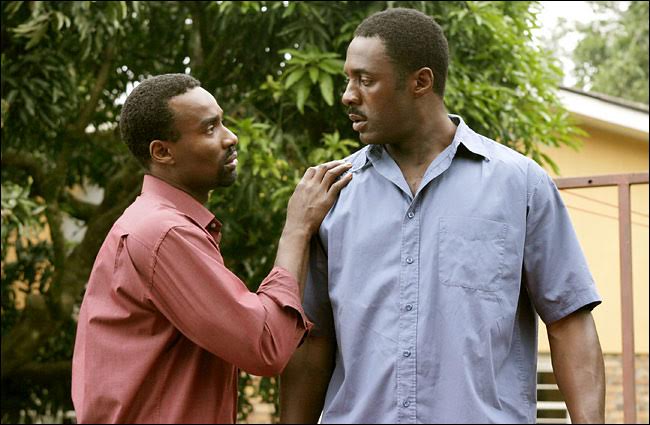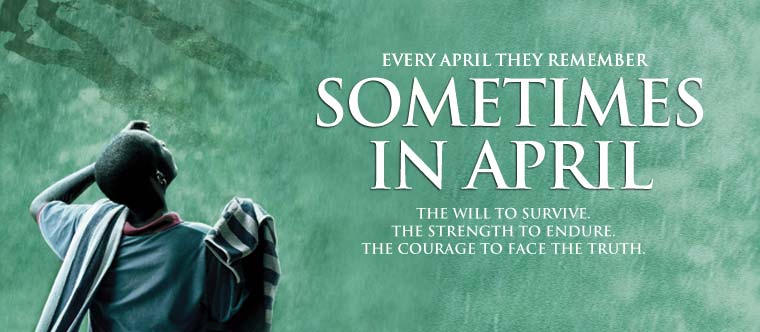Haitian film-maker Raoul Peck’s TV movie “Sometimes in April” (2005) opens on April 7th, the day of remembrance of the victims of the Rwandan Genocide (800,000 people were killed in 1994). A girl in a Kigali school asks her teacher Augustin Muganza about what could have been to stop the killings. Augustin answers with a set of ‘Maybe’, and eventually says the truth “I don’t know what could have been done”. It’s that uncertainty which haunts all of us humans trying to understand an act of genocide. “Sometimes in April” doesn’t treat its perpetrators as ‘monsters’, who have shed their human skin to maul innocent civilians. Raoul Peck includes the archival footage of Belgian colonialists shaking hands with an untrusting tribal leader, through which we could guess how that alleged ‘monster’ is evoked into being. By the year 1994, everyone from international community to the Rwandan bureaucrats have either silently witnessed or gratified the ‘monster’. The ‘monster’ asked for ID cards (to separate Hutus & Tutsis), commenced its little, public persecutions, which all set the stage for mass killings that started on April 1994.
“Sometimes in April” isn’t based on true events or a historical figure like Paul Rusesabagina (in “Hotel Rwanda”). Its protagonist Augustin (Idris Elba) is not a guiltless personality who is easily accessible to Western audiences. Augustin is a military captain, who trains civilians for Interhamwe militia (which participated in the genocide) and he shockingly watches as the machetes are handed over to Hutu extremists to kill the ‘cockroaches’. Although Augustin is hardly a hero, there is a central drama which allows us to get into the subject in a deeper and emotionally resonant manner. The story is set in two time periods – in 1994 & 2004. In April 2004, Augustin, now a schoolteacher, goes to visit his brother Honore Botera (Oris Erhuero), a DJ for hate radio RTLM. Honore is on trail at the International Criminal Tribunal, for his part in inciting the killings through inflammatory words. He states in a letter that he would tell Augustin about the fate of his two sons and wife (Carole Karemara), a Tutsi woman. Augustin’s present day partner Martine (Pamela Nomvete) was the teacher at a girl school, attended by Augustin’s elder daughter Anne-Marie, whom along with other girls was mass murdered. The plot structure simply but powerfully traces Martine and Augustin’s past traumas, fear and their desire to imbue some hope for a better future.
Director Peck, who is also a documentary film-maker, understands the limitations set by a conventional historical fiction. Through the easily accessible emotional dilemmas of his characters, Peck allows us an entry point, but he absolutely denies incorrect catharsis to bring a closure for the plot. He entrenches a thought in our sub-conscious that the struggles for Rwanda and its people aren’t just over with the UN tribunals (“How are we going to move forward?” is asked at one point, for which no answer is given). Despite Augustin conquering the estrangement he feels with Martine, the country’s festering wounds in the end, really offers a haunting perspective. Peck also impeccably establishes how violence is normalized into a society. His frames doesn’t prod the killers as ‘monsters’: they are seen as farmers, who goes to killing in the morning as if going to work in the fields; they are teenagers drinking beer at roadblocks, after killing with their machetes; they are priests who allow the military to rape women & girls in a safety camp; they are just simple men, who listen to vile propaganda flowing through radios. Peck hasn’t shown us a slumbering community slowly awakened by monstrosity. The unapologetic killings are seen as an extension of past persecutions that have gradually reached a culmination point.
Director Peck doesn’t avoid portraying the incessant massacres of people, in homes, streets, etc (the killing of the girls is the most distressing sequence in the film), although these scenes were filmed in a way that doesn’t diffuse an emotional numbness. We see long shots of Kigali burning, while little unidentifiable persons in the frame hacking bodies with machetes. Those shots seem to reflect over the world view (of that time), which saw the mass murders as ‘just another fight in Africa’. Peck also amply uses the Western TV footage (discussing over the legal definition of ‘genocide’) and set of fictitious American characters to show bureaucratic uselessness during the genocide (in one news footage, we hear the suicide of Kurt Cobain before the report of mass killings). Is it necessary to include a sympathetic ‘White’ character (Prudence Bushnell, played by Debra Winger)? I don’t know, although the American characters genuinely depicted the inaction of an administration that calls itself as ‘super-power’.
“Sometimes in April” (140 minutes) is not only a thorny, thought-provoking drama on the Rwandan genocide, but also explores the political apathy & emotional passivity in general.




